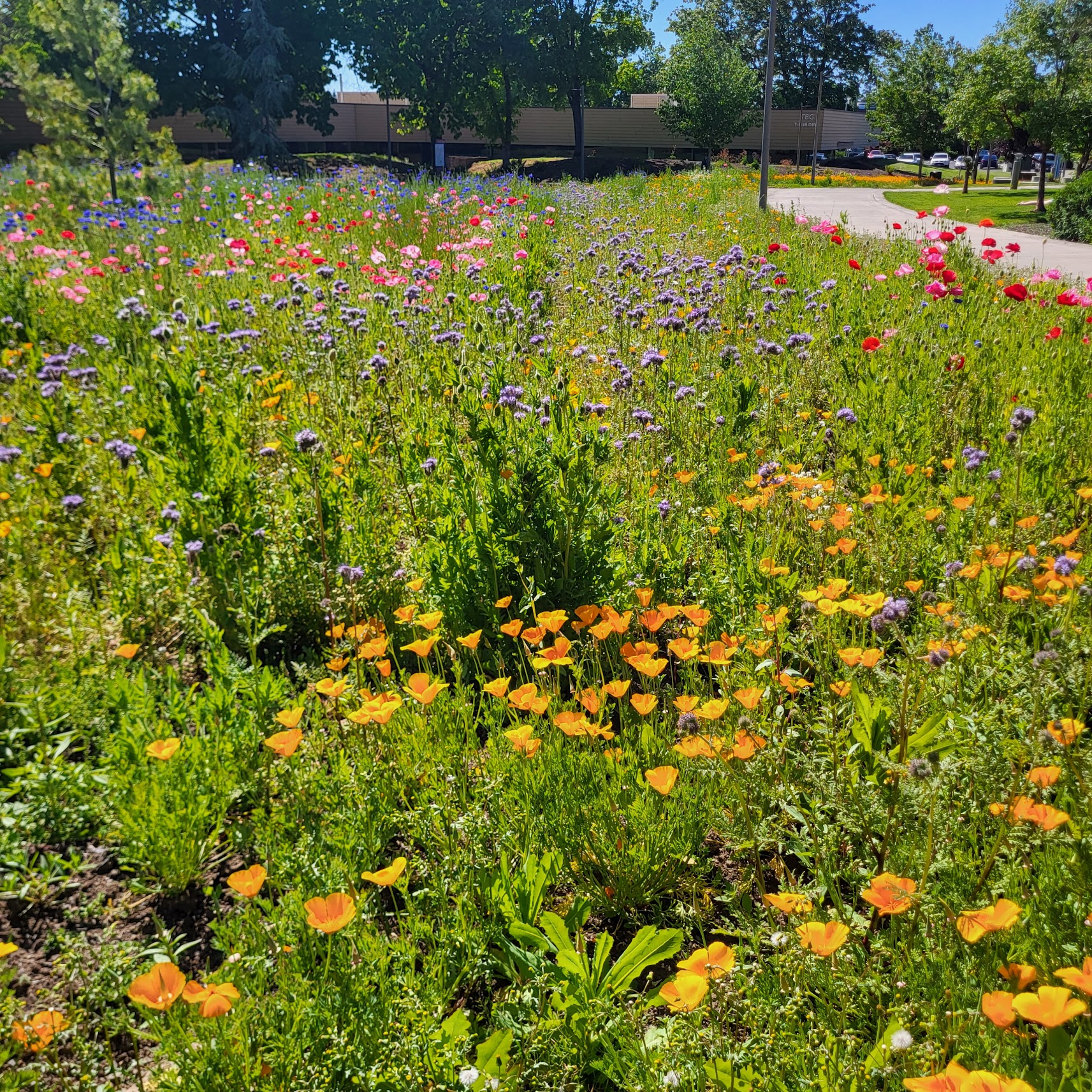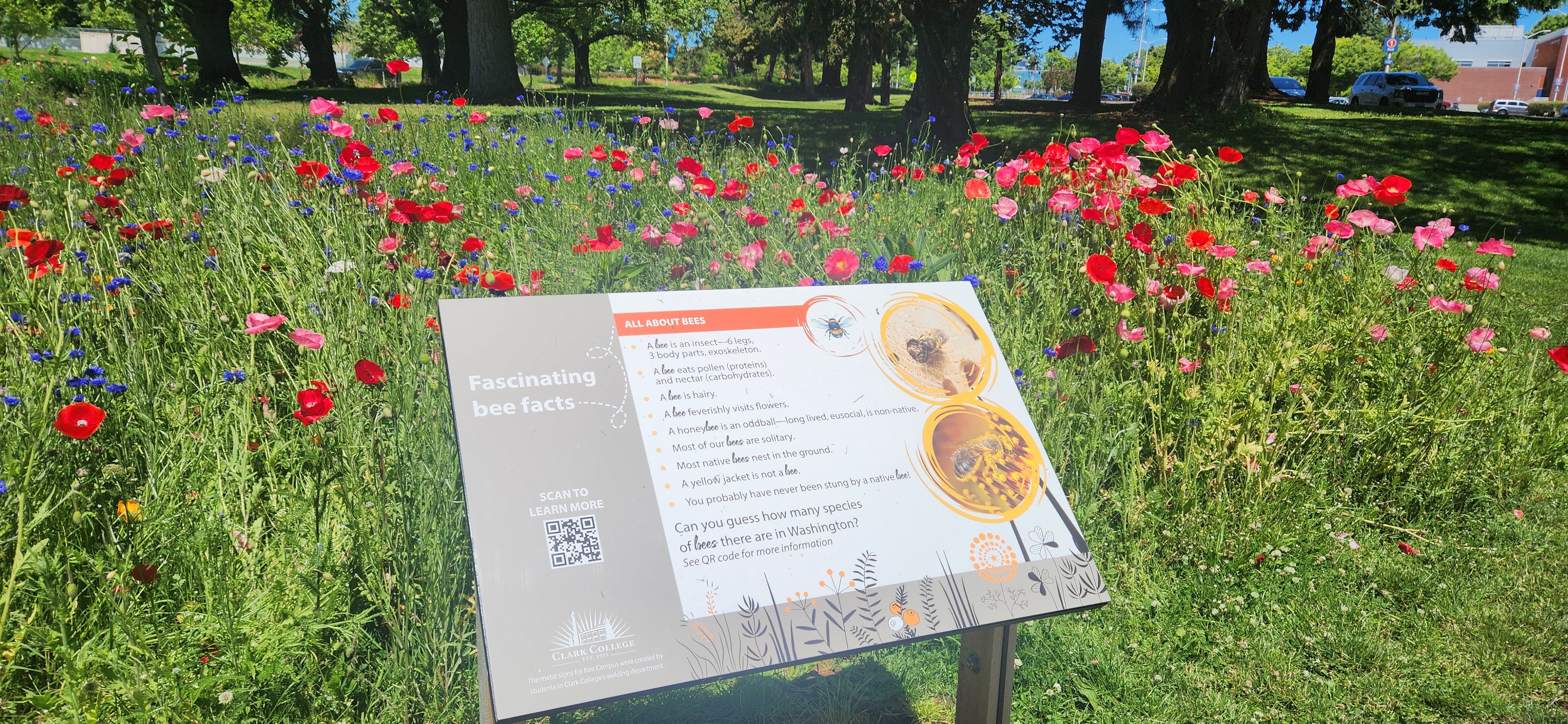Rare Bee Discovered at Clark
A species spotted only four times in Washington last year
 When a group of bee collectors visited Clark College’s Bee Gardens in August 2024,
they hoped to help expand the Washington Bee Atlas, a growing database of the state’s
bee biodiversity. What they didn’t expect was a rare find. Volunteer collector Kyle Roslund spotted a pointy Stelis bee—an uncommon parasitic species documented just four times in Washington last year.
When a group of bee collectors visited Clark College’s Bee Gardens in August 2024,
they hoped to help expand the Washington Bee Atlas, a growing database of the state’s
bee biodiversity. What they didn’t expect was a rare find. Volunteer collector Kyle Roslund spotted a pointy Stelis bee—an uncommon parasitic species documented just four times in Washington last year.
Becoming a Bee Campus
Seeing other species of bees on campus, however, is not a new experience. Clark College pursued certification as a Bee Campus in 2023, and as part of that certification, the grounds crew tilled landscaped lawns, and the Bee Campus Committee sowed native wildflower seeds to create several large pollinator gardens. After those gardens bloomed, bees were found buzzing away on the acres of flowers spread across campus. Biology students set out mason bee nests and started counting the bees. Students identified bumblebees, mason bees, sweat bees, digger bees, and leaf cutter bees.
A Rare Find
Most bees are very hairy—pollen clings to the hairs and allow female bees to easily collect this important protein and feed it to their offspring. But the bee found this past summer was not hairy because some bees don’t feed their offspring. Like the cuckoo bird that lays her eggs in another bird’s nest for another mother to feed, there are cuckoo bees that lay their eggs in another bee’s nest. These parasitic bees don’t need to collect pollen because once they lay their eggs in another bee’s nest, there is no need to collect pollen. This bee parasitizes leafcutter bees—she follows the leafcutter bee to her nest and when the leafcutter female leaves the nest, the cuckoo bee darts in and lays her own eggs atop the mass of pollen that the leafcutter female has collected.
The presence of this cuckoo bee is a cause for celebration of Clark’s Bee Gardens! The parasite is only successful when there is a robust population of leafcutter bees. This means that Clark’s bee flowers have attracted bees, and in turn, the bees have attracted the rare cuckoo bee.
Finding a rare bee is certainly good for the insect—it means that bees have found habitat at Clark College. Finding a rare bee is also a reminder of how Clark engages with community partners, which is part of Clark’s Strategic Plan, as we wouldn’t have found the bee if we hadn’t partnered with Washington Bee Atlas.
When students return to monitoring bees this coming spring, we’ll look specifically for this rare bee. Perhaps an enterprising group of students will find a different “new-to-Clark" bee this spring! Learn more about cuckoo bees and see photos on the Washington State Department of Agriculture website.

Bee-Friendly: The New Buzz Word
Promoting pollinator health is something that the greater region is also focusing on. The City of Vancouver became an official Bee City in April 2025, and Ridgefield has started the conversation about following suit. Other local institutions, like Lewis & Clark College and Portland State University, are also official bee campuses.
Becoming an official Bee City or Campus means that these communities are being more intentional with their decisions and policies, taking meaningful action towards preserving bees and other species that are critical to the health of our local environment and food supplies.
Learn More About Clark's Bee Campus
Clark College earned certification as a Bee Campus affiliate in April 2023. A Bee Campus USA affiliate is a college campus that includes a bee habitat, becoming the fifth college in Washington to earn that distinction. Learn more about Clark’s Bee Campus status here.
Photos: Clark College/Steven Clark & Maureen Hefflin
Story by Steven Clark, Biology Professor Emeritus
